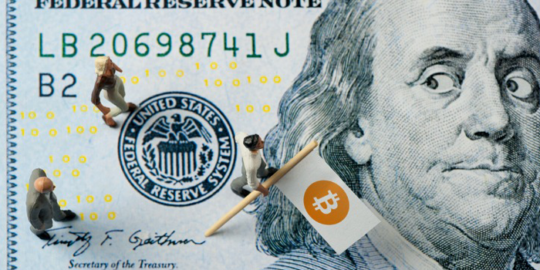As U.S. politicians battle over the 2,700-page, multitrillion-dollar infrastructure bill… crypto taxes have become a sticking point.
I know, it seems ridiculous crypto taxes would be a major part of legislation focused on improving the nation’s roads and bridges. But that’s Washington for you.
Naturally, crypto supporters are angry about the threat to their industry’s future. Most agree higher taxes could push crypto-related developers and businesses out of the U.S., killing innovation and putting the country at a disadvantage.
Amid all the ruckus… no one knows for sure how the tax situation will turn out.
But despite the uncertainty and scary headlines, I’m glad to see crypto regulations getting some attention. Here’s what you should know…
Right now, U.S. politicians are hammering out details on a multitrillion-dollar infrastructure deal. It will be passed in phases, with the first being around $1 trillion.
Like most pieces of legislation, a lot of “extra stuff” ended up getting crammed into this massive bill.
Somewhere in the nearly 3,000-page bill… is a provision to tax cryptocurrencies in order to raise money for infrastructure costs. The provision is aimed at tightening tax reporting requirements on cryptocurrency transactions… in an effort to raise an estimated $28 billion in tax revenues over the next 10 years.
One of the sticking points involves the provision’s definition of a “broker,” which industry experts argue is too broad. On Monday, the U.S. Senate rejected a compromise amendment that clarified the definition to make sure it excludes crypto miners and software developers.
The details are still hazy, but be prepared for crazy headlines like ones we saw a few months ago, when rumors swirled that cryptos would be taxed at a rate of 80%.
Of course, the bill is already causing a furor in the crypto community. Last week, Mark Cuban warned of its potential effects on the crypto industry, saying:
Shutting off this growth engine would be the equivalent of stopping e-commerce in 1995 because people were afraid of credit card fraud. Or regulating the creation of websites because some people initially thought they were complicated and didn’t understand what they would ever amount to.
In recent days, some members of Reddit’s r/CryptoCurrency community even tried organizing a rally on Wall Street to protest the bill.
Again, the details still need to get hammered out. The big question is whether we’ll see higher tax rates on crypto gains… but so far, the main issues revolve around how the new requirements will affect miners and developers.
Hopefully, we’ll get clarification in the next few weeks as the infrastructure bill moves through Congress. It would be great for the industry and investors if cryptos were taxed the same as other investments such as stocks.
For investors, the important takeaway here is that stricter regulations (and tax reporting requirements) are coming.
And that’s fine…
Why taxes are good for crypto
No one likes paying taxes.
I understand the strong stance many crypto diehards have towards the tax issue. The crypto community is notoriously anti-establishment. For many users, the biggest benefit of crypto is the ability to make transactions without the use of a third party, like a bank. That’s one reason many users believe it should be exempt from taxes altogether.
Bitcoin wasn’t created by—and doesn’t need approval from—any government. And that’s a great thing.
But to think it would be exempt from taxation/regulation simply isn’t rational.
Every successful industry ends up paying taxes. Even industries that many folks frown upon—like tobacco or gambling—have continued to operate despite major opposition… because they pay a chunk of their profits as taxes. In a way, taxes are like a “stamp of approval” from the government.
Plus, some regulations are needed to help investors have peace of mind when it comes to opening brokerage accounts and trading on exchanges. Without basic safeguards, the industry wouldn’t attract as many users.
As I said, there’s a lot of uncertainty about how the tax situation will pan out for crypto. And as you probably know… Investors hate uncertainty. As a result, we’ll probably see more volatility in crypto prices over the next few months. And you’ll probably see more scary headlines about how the government is trying to kill crypto…
But once the rules and tax issues become clearer, it will give the industry and investors the guidelines they need to operate. In other words, once the rules are set, it will be a big “green light” for the industry.
That’s why I’m actually looking forward to paying my crypto taxes in the near future.
The fact that crypto taxation is in the infrastructure bill is a huge deal. It will help solidify the industry in the government’s view, since it will generate billions in tax revenue. And it will give investors clarity on how their investments will be taxed.
Be prepared for volatility in the crypto markets as the infrastructure bill gets hammered out. Any pullbacks in bitcoin/cryptocurrencies surrounding the tax issue will be a great buying opportunity for investors.
Daniel Creech is a Curzio Research analyst with over a
decade of experience. He writes on macro trends, large- and small-cap stocks, and
digital securities. He’s a regular contributor to Token Tracker, Curzio Research Advisory, and The Dollar Stock Club.
P.S. Meme stocks… Dogecoin… Robinhood… WallStreetBets…
Like it or not, a seismic shift has taken place in the markets…
And if you still look at trading the same way you always did, you’re missing out on what is arguably the biggest boon EVER for investors like us.
Watch as my colleague Luke explains how to cash in.
Daniel Creech is a Curzio Research analyst with over a
decade of experience. He writes on macro trends, large- and small-cap stocks, and
digital securities. He’s a regular contributor to Token Tracker, Curzio Research Advisory, and The Dollar Stock Club.











As U.S. politicians battle over the 2,700-page, multitrillion-dollar infrastructure bill… crypto taxes have become a sticking point.
I know, it seems ridiculous crypto taxes would be a major part of legislation focused on improving the nation’s roads and bridges. But that’s Washington for you.
Naturally, crypto supporters are angry about the threat to their industry’s future. Most agree higher taxes could push crypto-related developers and businesses out of the U.S., killing innovation and putting the country at a disadvantage.
Amid all the ruckus… no one knows for sure how the tax situation will turn out.
But despite the uncertainty and scary headlines, I’m glad to see crypto regulations getting some attention. Here’s what you should know…
Right now, U.S. politicians are hammering out details on a multitrillion-dollar infrastructure deal. It will be passed in phases, with the first being around $1 trillion.
Like most pieces of legislation, a lot of “extra stuff” ended up getting crammed into this massive bill.
Somewhere in the nearly 3,000-page bill… is a provision to tax cryptocurrencies in order to raise money for infrastructure costs. The provision is aimed at tightening tax reporting requirements on cryptocurrency transactions… in an effort to raise an estimated $28 billion in tax revenues over the next 10 years.
One of the sticking points involves the provision’s definition of a “broker,” which industry experts argue is too broad. On Monday, the U.S. Senate rejected a compromise amendment that clarified the definition to make sure it excludes crypto miners and software developers.
The details are still hazy, but be prepared for crazy headlines like ones we saw a few months ago, when rumors swirled that cryptos would be taxed at a rate of 80%.
Of course, the bill is already causing a furor in the crypto community. Last week, Mark Cuban warned of its potential effects on the crypto industry, saying:
In recent days, some members of Reddit’s r/CryptoCurrency community even tried organizing a rally on Wall Street to protest the bill.
Again, the details still need to get hammered out. The big question is whether we’ll see higher tax rates on crypto gains… but so far, the main issues revolve around how the new requirements will affect miners and developers.
Hopefully, we’ll get clarification in the next few weeks as the infrastructure bill moves through Congress. It would be great for the industry and investors if cryptos were taxed the same as other investments such as stocks.
For investors, the important takeaway here is that stricter regulations (and tax reporting requirements) are coming.
And that’s fine…
Why taxes are good for crypto
No one likes paying taxes.
I understand the strong stance many crypto diehards have towards the tax issue. The crypto community is notoriously anti-establishment. For many users, the biggest benefit of crypto is the ability to make transactions without the use of a third party, like a bank. That’s one reason many users believe it should be exempt from taxes altogether.
Bitcoin wasn’t created by—and doesn’t need approval from—any government. And that’s a great thing.
But to think it would be exempt from taxation/regulation simply isn’t rational.
Every successful industry ends up paying taxes. Even industries that many folks frown upon—like tobacco or gambling—have continued to operate despite major opposition… because they pay a chunk of their profits as taxes. In a way, taxes are like a “stamp of approval” from the government.
Plus, some regulations are needed to help investors have peace of mind when it comes to opening brokerage accounts and trading on exchanges. Without basic safeguards, the industry wouldn’t attract as many users.
As I said, there’s a lot of uncertainty about how the tax situation will pan out for crypto. And as you probably know… Investors hate uncertainty. As a result, we’ll probably see more volatility in crypto prices over the next few months. And you’ll probably see more scary headlines about how the government is trying to kill crypto…
But once the rules and tax issues become clearer, it will give the industry and investors the guidelines they need to operate. In other words, once the rules are set, it will be a big “green light” for the industry.
That’s why I’m actually looking forward to paying my crypto taxes in the near future.
The fact that crypto taxation is in the infrastructure bill is a huge deal. It will help solidify the industry in the government’s view, since it will generate billions in tax revenue. And it will give investors clarity on how their investments will be taxed.
Be prepared for volatility in the crypto markets as the infrastructure bill gets hammered out. Any pullbacks in bitcoin/cryptocurrencies surrounding the tax issue will be a great buying opportunity for investors.
P.S. Meme stocks… Dogecoin… Robinhood… WallStreetBets…
Like it or not, a seismic shift has taken place in the markets…
And if you still look at trading the same way you always did, you’re missing out on what is arguably the biggest boon EVER for investors like us.
Watch as my colleague Luke explains how to cash in.